Choosing organic pest control for your raised beds means protecting your plants while nurturing a magical garden ecosystem! You’ll attract friendly insects like ladybugs and offer a cozy home for earthworms. With homemade remedies like garlic spray or companion planting—think marigolds for pesky nematodes—you create vibrant soil that makes your plants thrive! Plus, you avoid harsh chemicals that can harm your garden companions. Doesn’t a lush, thriving garden sound appealing? Stick around to uncover even more delightful tips!
Benefits of Organic Pest Control
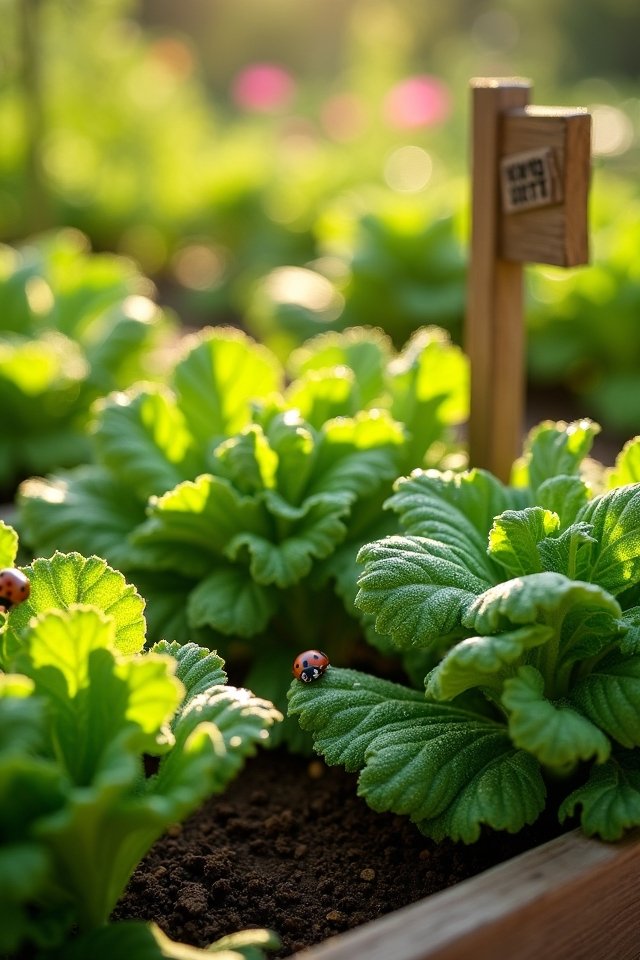
When you choose organic pest control for your raised beds, you’re not just protecting your plants—you’re nurturing the entire ecosystem! Think of it like being a guardian of your garden. By using innovative pest resistance strategies, you’re welcoming beneficial insects while escorting pests out the door. Organic pest repellents, like garlic spray or neem oil, can effectively chase away unwanted visitors without harming the environment. Plus, these methods enhance the health of your soil, making it richer and more vibrant! Who wouldn’t want a flourishing garden buzzing with life? By embracing this more natural approach, you’re not just growing vegetables; you’re cultivating a community—a green utopia where nature thrives! Isn’t that worth a little extra effort?
Understanding Common Pests in Raised Beds
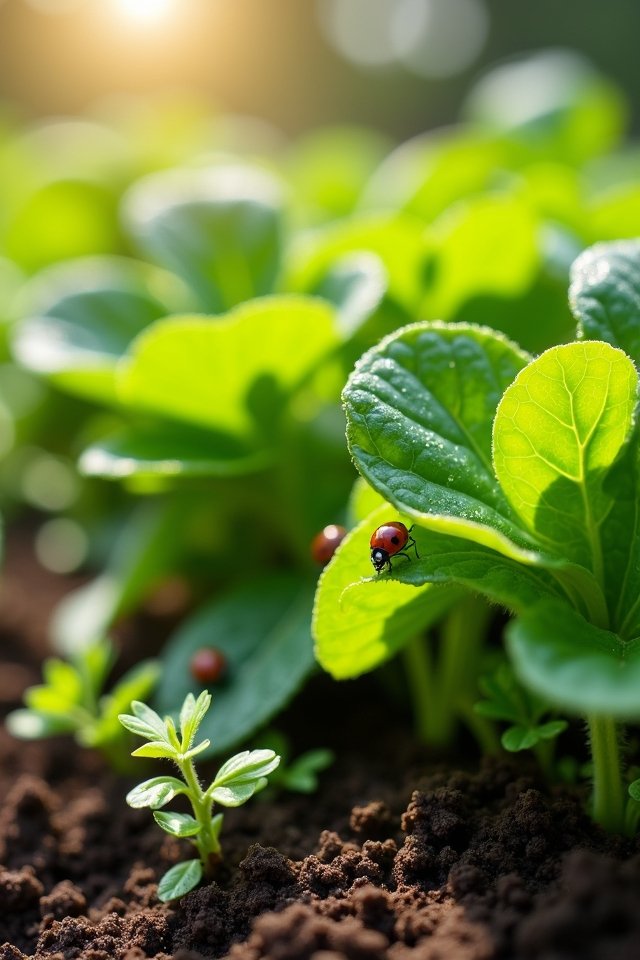
Your vibrant raised beds are a haven for all sorts of critters, and not all of them are friendly! Pests like aphids can be sneaky little thieves, sucking the life from your beloved greens. Knowing how to spot them is key — focus on their tiny, pear-shaped bodies! And then you have caterpillars, munching away like they’re at an all-you-can-eat buffet. For effective caterpillar control, check your plants regularly; if you see those pesky worms, act fast! Use innovative strategies to protect your crops. Just like a superhero swooping in, you can defend your garden against these intruders. So roll up your sleeves, stay vigilant, and give those critters a run for their money! Your raised beds will thank you!
Natural Methods for Pest Prevention
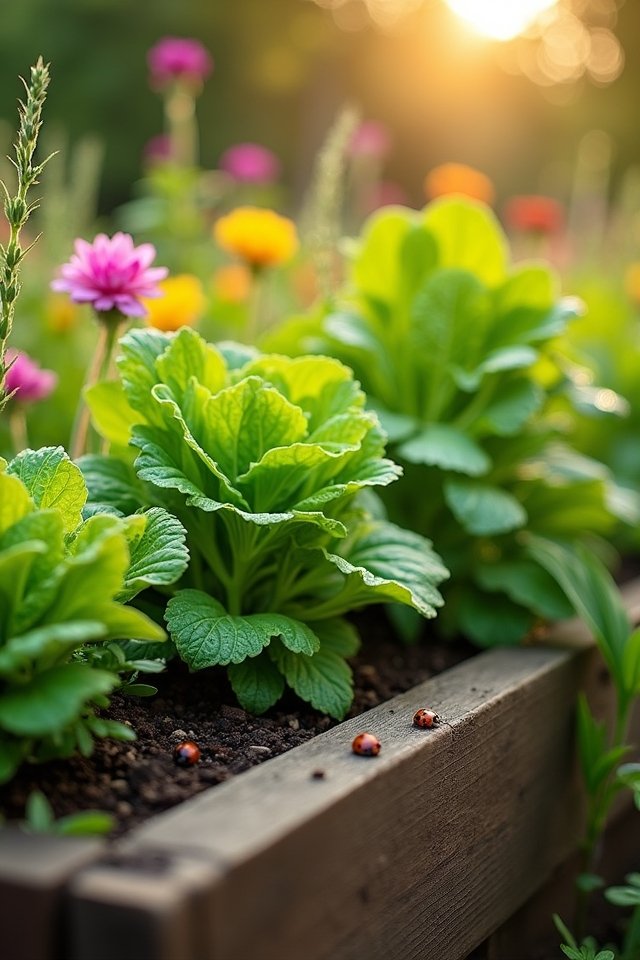
While some might think pests are unbeatable foes, there are plenty of natural methods you can use to keep them at bay! Start with companion planting; for instance, marigolds can repel pesky nematodes, while basil wards off mosquitoes and flies. It’s like planting a buddy system right in your garden! You can also whip up some homemade repellents using garlic or chili peppers. Just blend them with water, strain, and spray! You’ll be guarding your veggies like a pro. And don’t forget the power of essential oils—rosemary and peppermint work wonders, too! With these innovative tactics, you can turn your raised beds into a pest-free paradise. So roll up your sleeves and let nature do the talking!
Attracting Beneficial Insects
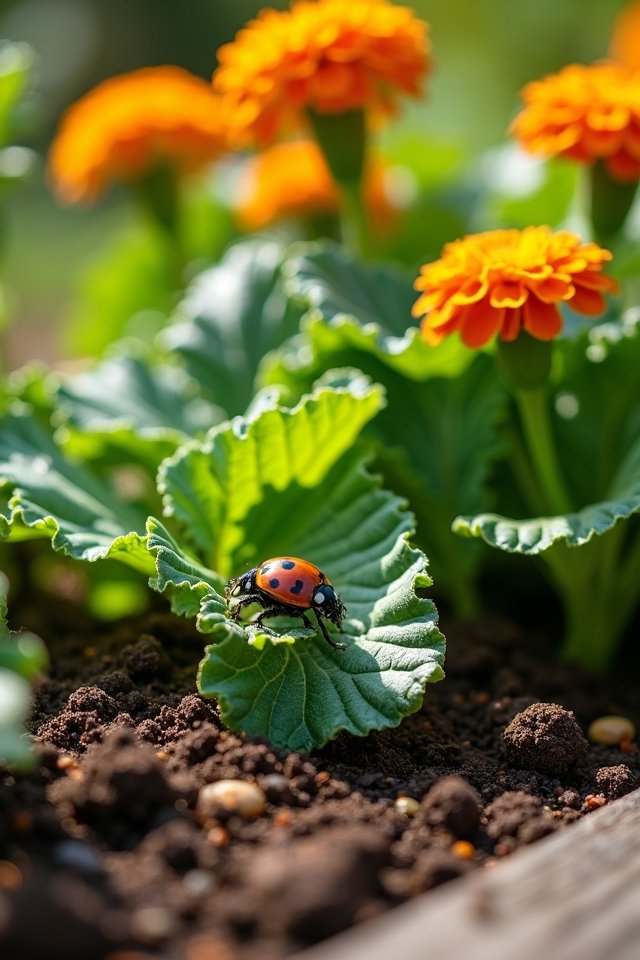
You can also create habitats with small piles of rocks or wood, giving them cozy nooks to hang out. Don’t forget to avoid harsh pesticides—they’re like “no entry” signs for your allies. So, roll up your sleeves, and let your garden be the talk of the insect town! Who knew green thumbs could become insect matchmakers?
Importance of Soil Health in Pest Management

Soil health is like the foundation of a happy garden ecosystem! When your soil bursts with biodiversity, it’s like a bustling city for earthworms, beneficial microbes, and all those tiny critters we love! This lively community creates a nutrient balance that keeps pests at bay—like hiring a bodyguard for your veggies!
Want stronger plants? Think of rich, healthy soil as their personal gym. It helps them fend off diseases and pests, making them super resilient. Plus, a thriving soil environment makes nutrients accessible, so your plants can soak them up like thirsty sponges.
Keep that soil buzzing with life, and you’ll see your garden flourish in vibrant colors and flavors. Isn’t nature awesome?
Sustainable Practices in Raised Bed Gardening
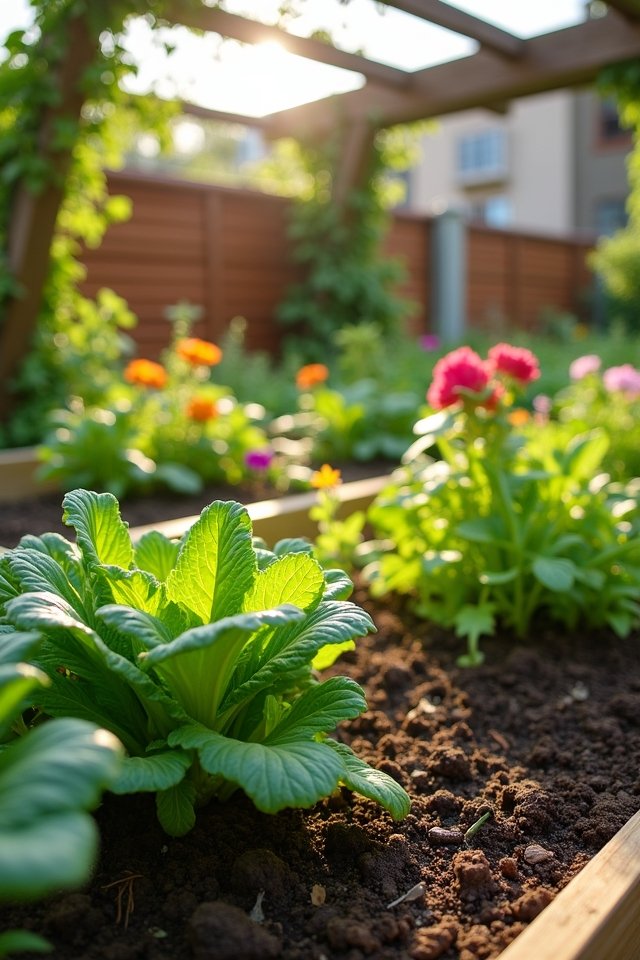
When you adopt sustainable practices in raised bed gardening, it’s like giving Mother Nature a high-five! Imagine the satisfaction of nurturing your plants using eco-friendly techniques. By incorporating crop rotation, you’re not just mixing things up in your garden; you’re also preventing nutrient depletion and pesky pests from settling in! Pair your crops through companion planting, where marigolds guard your tomatoes against aphids while boosting their growth. It’s like throwing a garden party where everyone is invited! You’ll feel a surge of pride, knowing you’re enhancing biodiversity while reaping delicious rewards. So, plunge into this innovative approach; your raised beds will flourish, and you’ll help create a happier planet, one vibrant veggie at a time! Ready, set, grow!
Frequently Asked Questions
How Does Organic Pest Control Impact Long-Term Garden Sustainability?
Organic pest control boosts your garden’s long-term sustainability like a superhero cape! It enhances soil health by nurturing beneficial microorganisms that create a rich, vibrant ecosystem. You’ll see more earthworms wriggling joyfully through your garden! Plus, it encourages biodiversity, attracting pollinators and natural pest predators. Imagine bees buzzing and birds chirping around you! So, why not welcome nature’s way? Your garden will thrive, and you’ll feel like a true eco-warrior! Isn’t that awesome?
Can Organic Methods Be Effective Against Stubborn Pest Infestations?
Can organic methods tackle those pesky pests? Absolutely! Think of natural remedies as your garden superheroes—like ladybugs swooping in to outsmart aphids. By understanding pest behavior, you’ll recognize their patterns and target them effectively. For stubborn infestations, try a garlic spray or diatomaceous earth—your plants won’t mind the smell! With persistence and creativity, you’ll turn chaos into harmony, keeping your garden flourishing. So, are you ready to join the organic revolution?
What Are the Costs Associated With Organic Pest Control Solutions?
The costs of organic pest control can vary, so keep your budget considerations in mind! You’ll likely spend a bit more than on conventional options, but think of it as investing in vibrant, healthy plants! For example, organic insect sprays or beneficial insects like ladybugs can be money well spent, turning pest prevention into a blooming success! Just imagine your garden flourishing while being eco-friendly—now, that’s a revitalizing thought, right? Happy gardening!
Are There Specific Organic Products Recommended for Raised Beds?
Curious about organic products for your raised beds? You’re in luck! Neem oil‘s like a superhero, battling unwanted pests while being gentle on your plants! And then there’s Diatomaceous earth, a magical powder that’s tough on bugs but safe for your veggies. Sprinkling these wonders gives you peace of mind. Imagine lush, thriving plants sipping sunshine, while pests scuttle away in fear! Isn’t that the garden dream we all crave? Let’s get growing!
How Does Weather Affect the Effectiveness of Organic Pest Control?
Weather’s like a quirky DJ, spinning tracks that affect pest life cycles! If it’s too hot or damp, pests can multiply faster than rabbits! Conversely, chilly rains may slow them down. So, keep an eye on those weather patterns! When you notice changes, adjust your organic pest control methods—think neem oil or diatomaceous earth. It’s like adjusting your playlist to match the mood. Stay proactive, and your garden will groove in harmony!


